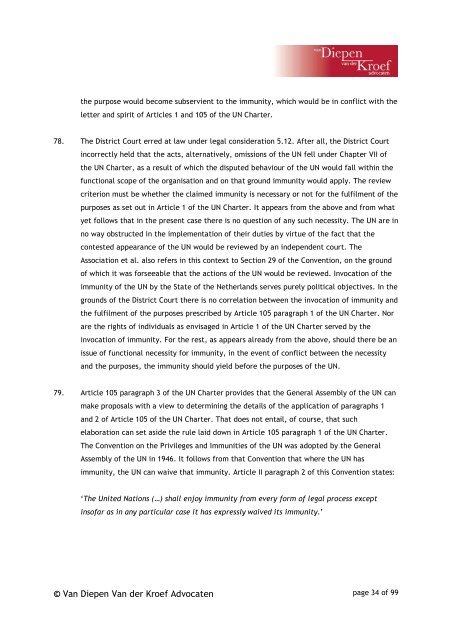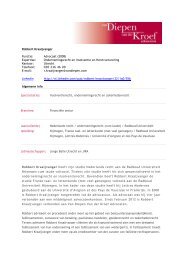© Van Diepen Van der Kroef Advocaten
© Van Diepen Van der Kroef Advocaten
© Van Diepen Van der Kroef Advocaten
- No tags were found...
You also want an ePaper? Increase the reach of your titles
YUMPU automatically turns print PDFs into web optimized ePapers that Google loves.
the purpose would become subservient to the immunity, which would be in conflict with theletter and spirit of Articles 1 and 105 of the UN Charter.78. The District Court erred at law un<strong>der</strong> legal consi<strong>der</strong>ation 5.12. After all, the District Courtincorrectly held that the acts, alternatively, omissions of the UN fell un<strong>der</strong> Chapter VII ofthe UN Charter, as a result of which the disputed behaviour of the UN would fall within thefunctional scope of the organisation and on that ground immunity would apply. The reviewcriterion must be whether the claimed immunity is necessary or not for the fulfilment of thepurposes as set out in Article 1 of the UN Charter. It appears from the above and from whatyet follows that in the present case there is no question of any such necessity. The UN are inno way obstructed in the implementation of their duties by virtue of the fact that thecontested appearance of the UN would be reviewed by an independent court. TheAssociation et al. also refers in this context to Section 29 of the Convention, on the groundof which it was forseeable that the actions of the UN would be reviewed. Invocation of theimmunity of the UN by the State of the Netherlands serves purely political objectives. In thegrounds of the District Court there is no correlation between the invocation of immunity andthe fulfilment of the purposes prescribed by Article 105 paragraph 1 of the UN Charter. Norare the rights of individuals as envisaged in Article 1 of the UN Charter served by theinvocation of immunity. For the rest, as appears already from the above, should there be anissue of functional necessity for immunity, in the event of conflict between the necessityand the purposes, the immunity should yield before the purposes of the UN.79. Article 105 paragraph 3 of the UN Charter provides that the General Assembly of the UN canmake proposals with a view to determining the details of the application of paragraphs 1and 2 of Article 105 of the UN Charter. That does not entail, of course, that suchelaboration can set aside the rule laid down in Article 105 paragraph 1 of the UN Charter.The Convention on the Privileges and Immunities of the UN was adopted by the GeneralAssembly of the UN in 1946. It follows from that Convention that where the UN hasimmunity, the UN can waive that immunity. Article II paragraph 2 of this Convention states:‘The United Nations (…) shall enjoy immunity from every form of legal process exceptinsofar as in any particular case it has expressly waived its immunity.’<strong>©</strong> <strong>Van</strong> <strong>Diepen</strong> <strong>Van</strong> <strong>der</strong> <strong>Kroef</strong> <strong>Advocaten</strong> page 34 of 99
















